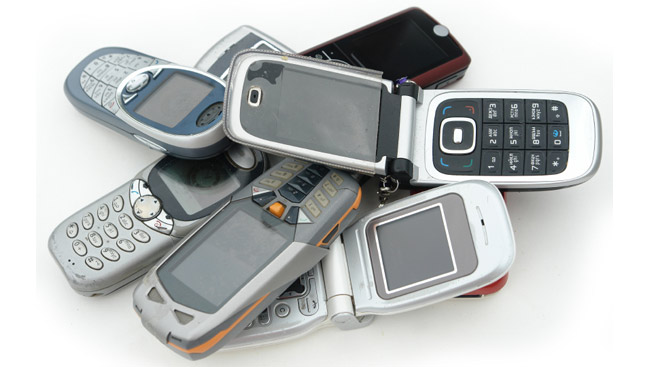One of the leitmotifs of discussions of modern mobile electronics is the thesis that 'smart' technologies negatively affect the intelligence and social activity of users. In a short article, Evan Blass expresses his point of view on the problem.

True fans of smartphones, such as myself and many of those who read this text, have been waiting for their appearance all their lives. There is a separate type of personality – a gadget lover, a person who carefully tries to own only the most functional and occupying the minimum amount of space, be it a Swiss knife, Leatherman multi-tools or universal digital devices.
A recent article by the Financial Times, whose headline suggests the return of ordinary mobile phones to ubiquity, puzzled me, who had long since realized that I belong to the aforementioned group of mobile electronics users. The message of the material is not in a banal Luddite manifesto, the text talks about how smartphones make many of us (including the author) addicted to them. According to the author of the article, the irresistible craving for the phone reminded her of her addiction to tobacco smoking, tk. both processes have their negative sides. The essence of the material boils down to the fact that 'smart' devices draw in the user, at the same time socially isolate him / her, providing us with content on the screen in exchange for live, real communication. We need to completely transfer the work with data to the computer and abandon the devices about which we argue, read and look at so much. The problem is that simply ditching smartphones in favor of regular phones won't do the trick.

Of course, the idea is not new. People have been lost in the digital space since the days of the PC. Internet addiction has been widely studied and described at the stage of the beginning of communication with the online space, every now and then there is a new ailment caused by excessive use of gadgets (carpal tunnel syndrome, de Quervain's disease, computer visual syndrome, etc.). Despite the large list of risk factors that certain gadgets have, smartphones have a special position: they are almost always at hand. When you leave home, your dependence on the big screen is, from a practical point of view, partly leveled by your smartphone. So what about the dependence on the latter?
If we take it as an axiom that the mentioned article addresses a serious problem, the relevance of which is confirmed by the observed behavior, then the question arises: is it a logical solution to reduce the attractiveness of smartphones for everyday use? To me, this is a bit silly and also completely ineffective. To use the analogy with smoking, fighting smartphones with ordinary mobile phones is akin to trying to quit smoking with a jar of chewing tobacco at all times. Many of the simple devices that do not have the 'smart' prefix in the name are distinguished by quite good functionality and can potentially distract the user from the real perception of the world no worse than their eminent and more advanced colleagues. Speaking of a waste of time, the most primitive mobile phones have in their arsenal several games and the ability to send text messages. Perhaps to eliminate this temptation, solutions such as devices for the elderly from Jitterbug were created.

I am suggesting that so-called 'simple' phones can also distract the user from the necessary tasks, which contradicts the arguments described in the Financial Times article. This logic is at the heart of the law that drivers are required to use a headset when talking while driving, it ignores the fact that the main distraction is the conversation itself, and not just holding the phone to their ear. However, this conclusion leads us to an even more frustrating potential solution to the problem – a complete rejection of smartphones. I consider this method to be an overly broad and harsh way to solve a problem, which really requires only an effort of will, the same effort that is required to abandon a fully pumped smartphone in favor of one of the simple mobile phones that are quickly disappearing from the market. (Which of the recent regular phones comes to mind? I thought so.)
My idea goes something like this: even if the mobile lifestyle is fraught with risks and negative consequences, I am still ready to go for it. The smartphone is the crown of all-round devices, the quintessence of the ideal gadget that many of us have been looking for, consciously or unconsciously, for many years. In addition to the amazing capabilities of the phones themselves, they have the added advantage of giving life to communities of enthusiasts with similar ideas.
What do you think? Are simple phones the answer to a society that is slowly but surely withdrawing into itself, sucking its heads into its shells as we change the values of the real world to digital? Or is there some kind of social function in these interactions in the cyber world, even if the balance between the real and the virtual is more and more on the side of the latter?
Original material by Evan Blass (evleaks).
Elir: The conflict between the increasingly popular virtual dimension and the real world is relevant for most active users of modern gadgets. Someone will call it a curse, someone is able to make money on it and even build a career, but the problem is rather complicated and does not have an unambiguous solution. Yes, everyone decides for himself what role he gives to the screen of a smartphone / tablet / computer, but real life will sooner or later remind of itself. Will regular phones be the salvation in this situation? For someone – yes, no doubt, serious addiction can often be overcome only in such ways. I fully agree with the author: the key to success in minimizing smartphone addiction is willpower and the correct allocation of your time. Everything is in our head.
